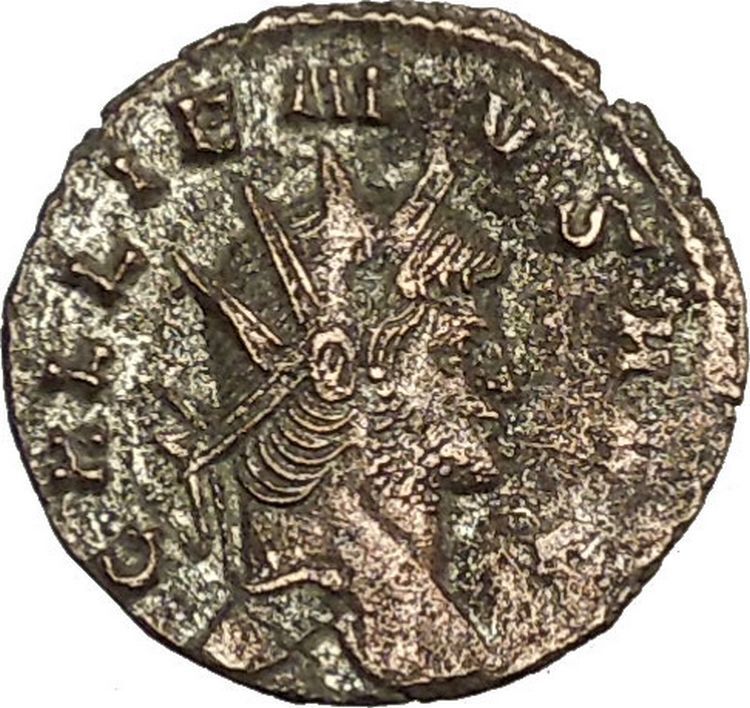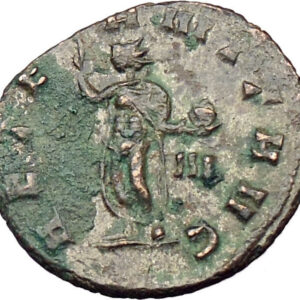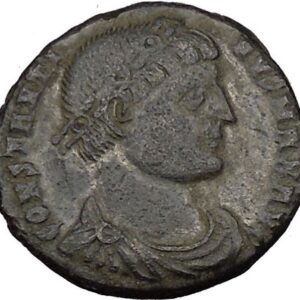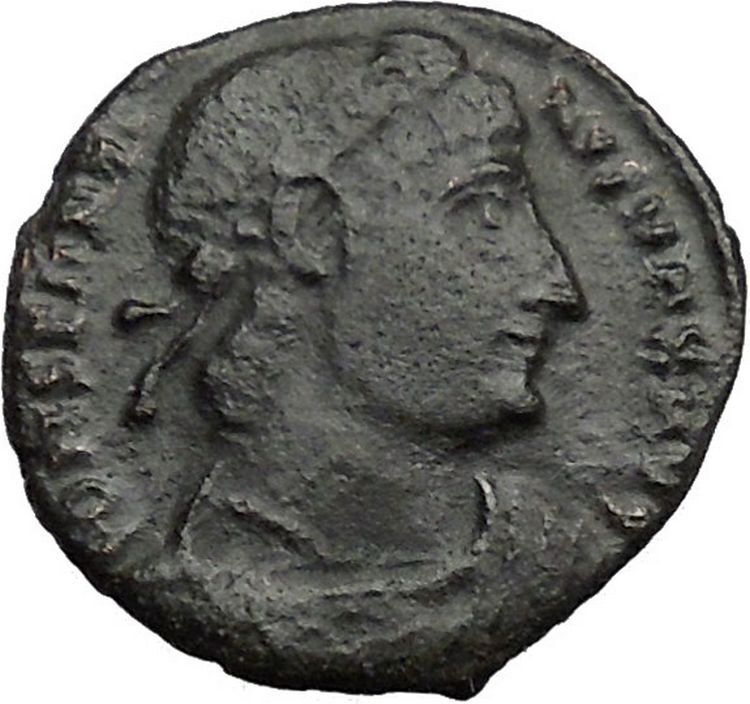|
Tacitus – Roman Emperor: 275-276 A.D.
Bronze Antoninianus 23mm (3.2 grams) Tripolis mint, struck 276 A.D.
Reference: RIC 213 var (sceptre type);
IMP C M CL TACITVS AVG, radiate, draped and cuirassed bust right.
CLEMENTIA TEMP, emperor standing right in military dress, holding eagle-tipped sceptre, receiving globe from Jupiter, standing left, holding sceptre; star in lower centre; mintmark KA in exergue below.
You are bidding on the exact item pictured, provided with a Certificate of Authenticity and Lifetime Guarantee of Authenticity.
 Jupiter, called Zeus by the Greeks. Jupiter was originally an elemental divinity, and his name signifies the father or lord of heaven, being a contraction of Diovis pater, or Diespiter. Being the lord of heaven, he was worshipped as the god of rain, storms, thunder, and lightning, whence he had the epithets of Pluvius, Fulgurator, Tonitrualis, Tonans, and Fulminator. As the pebble or flint stone was regarded as the symbol of lightning, Jupiter was frequently represented with such a stone in his hand instead of a thunderbolt. In concluding a treaty, the Romans took the sacred symbols of Jupiter, viz. the sceptre and flint stone, together with some grass from his temple, and the oath taken on such an occasion was expressed by per Jovem Lapidem jurare. In consequence of his possessing such powers over the elements, and especially of his always having the thunderbolt at his command, he was regarded as the highest and most powerful among the gods. Hence he is called the Best and Most High (Optimus Maximus). His temple at Rome stood on the lofty hill of the Capitol, whence he derived the surnames of Capitolinus and Tarpeius. He was regarded as the special protector of Rome. As such he was worshipped by the consuls on entering upon their office ; and the triumph of a victorious general was a solemn procession to his temple. He therefore bore the surnames of Imperator, Victor, Invictus, Stator, Opihdus, Feretrius, Praedator, Triumphator, and the like. Under all these surnames he had temples or statues at Rome ; and 2 temples, viz. those of Jupiter Stator and of Jupiter Feretrius, were believed to have been built in the time of Romulus. Under the name of Jupiter Capitolinus, he presided over the great Roman games ; and under the name of Jupiter Latialis or Latiaris, over the Feriae Latinae. Jupiter, according to the belief of the Romans, determined the course of all human affairs. He foresaw the future, and the events happening in it were the results of his will. He revealed the future to man through signs in the heavens and the flight of birds, which are hence called the messengers of Jupiter, while the god himself is designated as Prodigialis, that is, the sender of prodigies. For the same reason the god was invoked at the beginning of every undertaking, whether sacred or profane, together with Janus, who blessed the beginning itself. Jupiter was further regarded as the guardian of law, and as the protector of justice and virtue. He maintained the sanctity of an oath, and presided over all transactions which were based upon faithfulness and justice. Hence Fides was his companion on the Capitol, along with Victoria ; and hence a traitor to his country, and persons guilty of perjury, were thrown down from the Tarpeian rock. – As Jupiter was the lord of heaven, and consequently the prince of light, the white colour was sacred to him, white animals were sacrificed to him, his chariot was believed to be drawn by 4 white horses, his priests wore white caps, and the consuls were attired in white when they offered sacrifices in the Capitol the day they entered on their office. The worship of Jupiter at Rome was under the special care of the Flamen Dialis, who was the highest in rank of all the flamens. {The Romans, in their representations of the god, adopted the type of the Greek Zeus. Jupiter, called Zeus by the Greeks. Jupiter was originally an elemental divinity, and his name signifies the father or lord of heaven, being a contraction of Diovis pater, or Diespiter. Being the lord of heaven, he was worshipped as the god of rain, storms, thunder, and lightning, whence he had the epithets of Pluvius, Fulgurator, Tonitrualis, Tonans, and Fulminator. As the pebble or flint stone was regarded as the symbol of lightning, Jupiter was frequently represented with such a stone in his hand instead of a thunderbolt. In concluding a treaty, the Romans took the sacred symbols of Jupiter, viz. the sceptre and flint stone, together with some grass from his temple, and the oath taken on such an occasion was expressed by per Jovem Lapidem jurare. In consequence of his possessing such powers over the elements, and especially of his always having the thunderbolt at his command, he was regarded as the highest and most powerful among the gods. Hence he is called the Best and Most High (Optimus Maximus). His temple at Rome stood on the lofty hill of the Capitol, whence he derived the surnames of Capitolinus and Tarpeius. He was regarded as the special protector of Rome. As such he was worshipped by the consuls on entering upon their office ; and the triumph of a victorious general was a solemn procession to his temple. He therefore bore the surnames of Imperator, Victor, Invictus, Stator, Opihdus, Feretrius, Praedator, Triumphator, and the like. Under all these surnames he had temples or statues at Rome ; and 2 temples, viz. those of Jupiter Stator and of Jupiter Feretrius, were believed to have been built in the time of Romulus. Under the name of Jupiter Capitolinus, he presided over the great Roman games ; and under the name of Jupiter Latialis or Latiaris, over the Feriae Latinae. Jupiter, according to the belief of the Romans, determined the course of all human affairs. He foresaw the future, and the events happening in it were the results of his will. He revealed the future to man through signs in the heavens and the flight of birds, which are hence called the messengers of Jupiter, while the god himself is designated as Prodigialis, that is, the sender of prodigies. For the same reason the god was invoked at the beginning of every undertaking, whether sacred or profane, together with Janus, who blessed the beginning itself. Jupiter was further regarded as the guardian of law, and as the protector of justice and virtue. He maintained the sanctity of an oath, and presided over all transactions which were based upon faithfulness and justice. Hence Fides was his companion on the Capitol, along with Victoria ; and hence a traitor to his country, and persons guilty of perjury, were thrown down from the Tarpeian rock. – As Jupiter was the lord of heaven, and consequently the prince of light, the white colour was sacred to him, white animals were sacrificed to him, his chariot was believed to be drawn by 4 white horses, his priests wore white caps, and the consuls were attired in white when they offered sacrifices in the Capitol the day they entered on their office. The worship of Jupiter at Rome was under the special care of the Flamen Dialis, who was the highest in rank of all the flamens. {The Romans, in their representations of the god, adopted the type of the Greek Zeus.
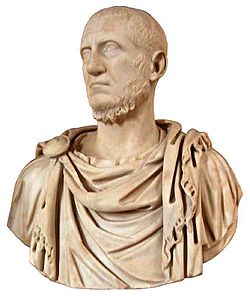 Marcus Claudius Tacitus (ca. 200 – June 276) was a Roman Emperor from September 25 275, to June 276. Marcus Claudius Tacitus (ca. 200 – June 276) was a Roman Emperor from September 25 275, to June 276.
He was born in Interamna (Terni), in Italia. He circulated copies of the historian Gaius Cornelius Tacitus’ work, which was barely read at the time, and so we perhaps have him to thank for the partial survival of Tacitus’ work; however, modern historiography rejects his claimed descent from the historian as forgery. In the course of his long life he discharged the duties of various civil offices, including that of consul in 273, with universal respect.
After the assassination of Aurelian, he was chosen by the Senate to succeed him, and the choice was cordially ratified by the army. His first action was to move against the barbarian tribes that had been gathered by Aurelian for his Eastern campaign, and which had plundered the Eastern Roman provinces after Aurelian had been murdered and the campaign cancelled. His half-brother, the Praetorian Prefect Florianus, and Tacitus himself won a victory against these tribes, among which Heruli, which granted the emperor the title Gothicus Maximus.
Tacitus probably died of fever (according to Aurelius Victor, Eutropius and the Historia Augusta) – though Zosimus claims he was assassinated – at Tyana in Cappadocia in June 276.
|





 Jupiter, called Zeus by the Greeks. Jupiter was originally an elemental divinity, and his name signifies the father or lord of heaven, being a contraction of Diovis pater, or Diespiter. Being the lord of heaven, he was worshipped as the god of rain, storms, thunder, and lightning, whence he had the epithets of Pluvius, Fulgurator, Tonitrualis, Tonans, and Fulminator. As the pebble or flint stone was regarded as the symbol of lightning, Jupiter was frequently represented with such a stone in his hand instead of a thunderbolt. In concluding a treaty, the Romans took the sacred symbols of Jupiter, viz. the sceptre and flint stone, together with some grass from his temple, and the oath taken on such an occasion was expressed by per Jovem Lapidem jurare. In consequence of his possessing such powers over the elements, and especially of his always having the thunderbolt at his command, he was regarded as the highest and most powerful among the gods. Hence he is called the Best and Most High (Optimus Maximus). His temple at Rome stood on the lofty hill of the Capitol, whence he derived the surnames of Capitolinus and Tarpeius. He was regarded as the special protector of Rome. As such he was worshipped by the consuls on entering upon their office ; and the triumph of a victorious general was a solemn procession to his temple. He therefore bore the surnames of Imperator, Victor, Invictus, Stator, Opihdus, Feretrius, Praedator, Triumphator, and the like. Under all these surnames he had temples or statues at Rome ; and 2 temples, viz. those of Jupiter Stator and of Jupiter Feretrius, were believed to have been built in the time of Romulus. Under the name of Jupiter Capitolinus, he presided over the great Roman games ; and under the name of Jupiter Latialis or Latiaris, over the Feriae Latinae. Jupiter, according to the belief of the Romans, determined the course of all human affairs. He foresaw the future, and the events happening in it were the results of his will. He revealed the future to man through signs in the heavens and the flight of birds, which are hence called the messengers of Jupiter, while the god himself is designated as Prodigialis, that is, the sender of prodigies. For the same reason the god was invoked at the beginning of every undertaking, whether sacred or profane, together with Janus, who blessed the beginning itself. Jupiter was further regarded as the guardian of law, and as the protector of justice and virtue. He maintained the sanctity of an oath, and presided over all transactions which were based upon faithfulness and justice. Hence Fides was his companion on the Capitol, along with Victoria ; and hence a traitor to his country, and persons guilty of perjury, were thrown down from the Tarpeian rock. – As Jupiter was the lord of heaven, and consequently the prince of light, the white colour was sacred to him, white animals were sacrificed to him, his chariot was believed to be drawn by 4 white horses, his priests wore white caps, and the consuls were attired in white when they offered sacrifices in the Capitol the day they entered on their office. The worship of Jupiter at Rome was under the special care of the Flamen Dialis, who was the highest in rank of all the flamens. {The Romans, in their representations of the god, adopted the type of the Greek Zeus.
Jupiter, called Zeus by the Greeks. Jupiter was originally an elemental divinity, and his name signifies the father or lord of heaven, being a contraction of Diovis pater, or Diespiter. Being the lord of heaven, he was worshipped as the god of rain, storms, thunder, and lightning, whence he had the epithets of Pluvius, Fulgurator, Tonitrualis, Tonans, and Fulminator. As the pebble or flint stone was regarded as the symbol of lightning, Jupiter was frequently represented with such a stone in his hand instead of a thunderbolt. In concluding a treaty, the Romans took the sacred symbols of Jupiter, viz. the sceptre and flint stone, together with some grass from his temple, and the oath taken on such an occasion was expressed by per Jovem Lapidem jurare. In consequence of his possessing such powers over the elements, and especially of his always having the thunderbolt at his command, he was regarded as the highest and most powerful among the gods. Hence he is called the Best and Most High (Optimus Maximus). His temple at Rome stood on the lofty hill of the Capitol, whence he derived the surnames of Capitolinus and Tarpeius. He was regarded as the special protector of Rome. As such he was worshipped by the consuls on entering upon their office ; and the triumph of a victorious general was a solemn procession to his temple. He therefore bore the surnames of Imperator, Victor, Invictus, Stator, Opihdus, Feretrius, Praedator, Triumphator, and the like. Under all these surnames he had temples or statues at Rome ; and 2 temples, viz. those of Jupiter Stator and of Jupiter Feretrius, were believed to have been built in the time of Romulus. Under the name of Jupiter Capitolinus, he presided over the great Roman games ; and under the name of Jupiter Latialis or Latiaris, over the Feriae Latinae. Jupiter, according to the belief of the Romans, determined the course of all human affairs. He foresaw the future, and the events happening in it were the results of his will. He revealed the future to man through signs in the heavens and the flight of birds, which are hence called the messengers of Jupiter, while the god himself is designated as Prodigialis, that is, the sender of prodigies. For the same reason the god was invoked at the beginning of every undertaking, whether sacred or profane, together with Janus, who blessed the beginning itself. Jupiter was further regarded as the guardian of law, and as the protector of justice and virtue. He maintained the sanctity of an oath, and presided over all transactions which were based upon faithfulness and justice. Hence Fides was his companion on the Capitol, along with Victoria ; and hence a traitor to his country, and persons guilty of perjury, were thrown down from the Tarpeian rock. – As Jupiter was the lord of heaven, and consequently the prince of light, the white colour was sacred to him, white animals were sacrificed to him, his chariot was believed to be drawn by 4 white horses, his priests wore white caps, and the consuls were attired in white when they offered sacrifices in the Capitol the day they entered on their office. The worship of Jupiter at Rome was under the special care of the Flamen Dialis, who was the highest in rank of all the flamens. {The Romans, in their representations of the god, adopted the type of the Greek Zeus. Marcus Claudius Tacitus (ca. 200 – June 276) was a Roman Emperor from September 25 275, to June 276.
Marcus Claudius Tacitus (ca. 200 – June 276) was a Roman Emperor from September 25 275, to June 276.

